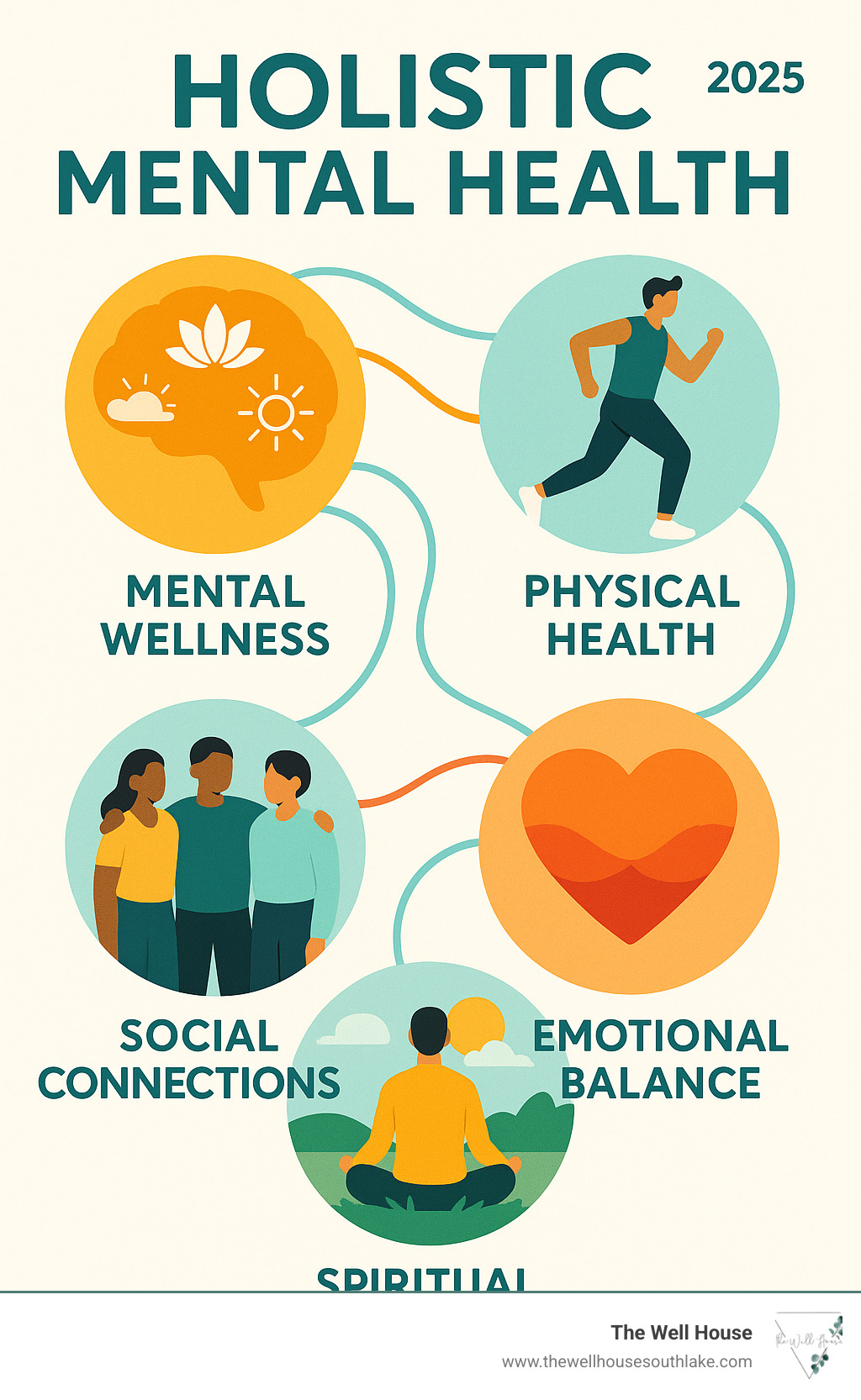Mind, Body, Spirit: Discovering Holistic Mental Health Solutions
Introduction: The Whole-Person Approach to Wellness
Holistic mental health is an approach that treats the whole person—mind, body, and spirit—not just symptoms or diagnoses. This integrative method recognizes that mental well-being is deeply connected to physical health, emotional balance, spiritual fulfillment, and social connections.
Key Components of Holistic Mental Health:
- Mind: Emotional regulation, stress management, mindfulness practices
- Body: Nutrition, exercise, sleep, and physical wellness
- Spirit: Personal values, purpose, and meaning-making
- Community: Social support networks and healthy relationships
- Root Cause Focus: Addressing underlying issues rather than just symptoms
With mental health conditions rising globally—from 416 million people in 1990 to over 615 million today, per the World Health Organization—there’s a growing shift from symptom management toward addressing root causes through holistic methods.
Unlike conventional care, which often focuses on medication and talk therapy, holistic mental health integrates complementary practices like mindfulness, yoga, and nutrition counseling. This empowers individuals to actively participate in their healing by addressing all interconnected factors that influence well-being.
I’m Jennifer Kruse, a Licensed Professional Counselor Supervisor specializing in soul-mind-body integration. In my practice in the Dallas-Fort Worth area, I’ve witnessed how this whole-person approach creates lasting, authentic healing.

Find more about holistic mental health:
Holistic vs. Traditional Mental Health Care: A Paradigm Shift
Imagine going to a doctor for a recurring headache. One approach is to give you pain medication every time it appears. A different approach asks why you’re getting headaches—exploring stress, sleep, or dehydration. This is the difference between traditional and holistic mental health care.
Traditional mental health treatment focuses on diagnosing conditions and managing symptoms through psychotherapy—like cognitive behavioral therapy (CBT)—and medication. This approach is crucial for providing relief and stability, especially in a crisis.
Holistic mental health care, however, looks at the bigger picture. It asks, “What’s happening in your whole life that might be contributing to how you feel?” It explores how sleep, relationships, diet, exercise, and purpose all work together to affect your mental well-being.
Here’s how these approaches compare:
| Aspect | Traditional Approach | Holistic Approach |
|---|---|---|
| Focus | Symptom management, Diagnosis | Root causes, Whole-person well-being |
| Treatment | Medication, Talk Therapy (e.g., CBT) | Integrated therapies (mind, body, spirit, social), Complementary practices, Lifestyle adjustments |
| Patient Role | Passive recipient of treatment | Active participant in healing and self-care |
| Goal | Alleviate symptoms, Stabilize condition | Achieve lasting wellness, Balance, Fulfillment |
These approaches aren’t mutually exclusive; they can work together to create a complete path to healing.
What is a holistic mental health approach?
A holistic approach is like tending to a whole garden—soil, sunlight, and water—not just treating a single wilted flower. It recognizes you’re a whole person, not just a collection of symptoms.
This approach is built on the biopsychosocial model, which examines three key areas: biological (genetics, brain chemistry), psychological (thoughts, emotions, coping skills), and social (relationships, community, culture). Understanding how these pieces fit together creates a more complete picture of your well-being.
At The Well House, we know that mental health challenges can stem from many sources, so we don’t believe in one-size-fits-all solutions. A helpful framework in functional psychiatry is the MENDS approach:
Medication (when appropriate), Exercise, Nutrition, Dhyana (meditation/mindfulness), and Sleep.
Your healing journey is unique. We work with you to find the right combination of approaches. As one client said, “It was a truly remarkable opportunity to upgrade your health on a wholesome level.” Focusing only on mental health while ignoring overall well-being just doesn’t make sense. Everything is connected. More info about our approach.
Benefits of a holistic mental health plan
Accepting a holistic mental health plan offers benefits that ripple throughout your life.
- Empowerment: You become an active participant in your health, learning to read your body’s signals and manage your well-being proactively.
- Lasting Change: By addressing root causes instead of just symptoms, improvements are more likely to stick.
- Improved Overall Health: When you improve sleep, nutrition, and relationships, your physical health and energy levels often get better, too.
- Greater Resilience: You develop a diverse toolkit of coping strategies—like mindfulness, exercise, or social connection—to handle life’s challenges.
- Mind-Body Connection: You learn how interconnected your mental and physical health are, using this link as a powerful tool for healing.
The impact is broader than just the individual. Depression and anxiety cost the global economy $1 trillion annually in lost productivity. As stigma fades—with 87% of American adults no longer viewing mental health disorders as shameful—it becomes easier to accept proactive, comprehensive approaches to well-being.
Holistic mental health isn’t about perfection—it’s about becoming whole.
The Four Pillars of Holistic Mental Health: Mind, Body, Spirit, and Community
Imagine your well-being as a home supported by four essential pillars: mind, body, spirit, and community. In holistic mental health, we focus on strengthening all four. When they are balanced, you feel grounded, resilient, and truly alive. These pillars are deeply connected, each one supporting the others.
The Mind: Nurturing Emotional and Psychological Well-being
Nurturing your mind involves developing skills to steer life’s challenges. Mindfulness and meditation train your mind to stay present. Even five minutes of deep, diaphragmatic breathing can reduce stress and improve cognitive function.
Psychotherapy remains a cornerstone, offering a safe space to process thoughts and emotions. At The Well House, we provide specialized Anxiety and Depression Counseling. Learning emotional regulation and stress management helps you recognize triggers and respond to emotions skillfully.
The Body: The Physical Foundation of Mental Health
Your physical and mental health are deeply connected. For example, your gut produces more serotonin (a key mood regulator) than your brain.
- Nutrition: Fueling your brain with nutrients like omega-3s and B vitamins supports mental health, while processed foods can worsen anxiety and depression.
- Exercise: Movement releases feel-good endorphins, acting as a natural mood booster. We help clients in Young Adult Therapy find enjoyable ways to stay active.
- Sleep Hygiene: Quality sleep is crucial for emotional and cognitive reset. Lack of sleep intensifies emotions and fogs thinking.
Chronic stress takes a physical toll, causing headaches, digestive issues, and muscle tension. Addressing stress holistically helps both mind and body.
The Spirit: Finding Purpose and Meaning
The spiritual pillar involves a deeper sense of connection to yourself, others, and your purpose, which may or may not include religion.
- Living by your values creates inner alignment and resilience. This is a central theme in our Career Counseling for Young Adults.
- Spending time in nature calms the nervous system and provides perspective.
- Journaling and creative expression offer outlets for feelings that are hard to verbalize, allowing for honest self-exploration.
Community: The Power of Social Connection
Humans are wired for connection, which is essential for mental health. Strong relationships act as a buffer against life’s challenges, while loneliness can be as stressful on the body as a chronic illness.
- Building healthy support networks is key. Even one or two deep connections can make a significant difference.
- Reducing isolation by engaging in face-to-face interactions is vital in our digital age. Joining a club, volunteering, or meeting a friend can boost well-being.
Family relationships are also foundational. We offer Parent Coaching and Marriage Counseling and Couples Therapy because healthy relationships help everyone thrive.
Exploring Common Holistic Therapies and Practices
While holistic mental health includes practices like meditation and yoga, the field is beautifully diverse. At The Well House, we use various complementary approaches to open new doors to healing that traditional therapy alone might not reach.

Somatic and Body-Based Therapies
These approaches recognize that trauma and stress are stored in the body.
- EMDR (Eye Movement Desensitization and Reprocessing) is a powerful tool we use to help the brain reprocess traumatic memories, so they lose their emotional charge. Learn more about our EMDR Therapy.
- Somatic Experiencing helps you tune into physical sensations to gently release stored traumatic stress.
- Breathwork uses conscious breathing to teach your nervous system how to regulate itself and find calm. A 2017 study showed somatic breathing helps with PTSD.
- Cranial Sacral Therapy uses a light touch to release tension in the central nervous system. Research from 2020 suggests it can be effective for trauma when combined with psychotherapy.
Expressive and Creative Arts Therapies
When words aren’t enough, creative expression can give voice to your experiences.
- Art therapy uses creative expression to regulate emotions and support recovery, no artistic skill required. Research using the SERATS scale confirms art-making supports mental health.
- Music therapy uses listening, drumming, or creating music for emotional expression and stress reduction.
- Dance and movement therapy uses movement to release stored tension and express emotions held in the body.
Movement and Mindfulness Practices
These practices weave together physical movement and mental awareness.
- Yoga therapy integrates breath, movement, and mindfulness to support healing. A 2021 review found it can help with addiction recovery, and trauma-informed yoga is especially healing for vulnerable populations.
- Tai Chi and Qigong are ancient Chinese practices of slow, flowing movements that calm the mind and strengthen the body, proven effective for stress relief.
- Grounding techniques, like the “5-4-3-2-1” method, are simple tools to pull you back to the present moment during anxiety. We explore these in Therapy for Moms.
Nature-Based and Alternative Therapies
These approaches reconnect us with the natural world’s healing power.
- Equine therapy: Working with intuitive horses helps you learn about trust, communication, and emotional regulation.
- Ecotherapy: This leverages the mental health benefits of nature through activities like gardening or hiking.
- Acupuncture: A 2018 analysis suggests this practice of using thin needles to stimulate healing can help with pain conditions like stress-related headaches.
- Massage therapy: Research shows massage can decrease depression and acute anxiety in addition to providing physical relaxation.
- Reiki: A gentle energy healing technique where a practitioner uses light touch to reduce stress, anxiety, and depression, as shown in 2019 and 2021 studies.
- Aromatherapy uses essential oils like lavender or peppermint to influence mood and support emotional balance.
Many of these can be explored through Online Counseling and Therapy, making holistic mental health more accessible.
Challenges and Considerations on the Holistic Path
While holistic mental health offers incredible potential, it’s important to be realistic about the journey. Understanding the challenges from the start can help you steer the path more effectively.
- Finding qualified practitioners: The term “holistic” is popular, so it’s crucial to verify a practitioner’s credentials. Look for licensed professionals (LPCs, psychologists) with specialized training and certifications in the modalities you’re interested in.
- Cost and insurance coverage: Cost can be a barrier, as many complementary therapies are not covered by insurance. Always check with your provider and discuss payment options with practitioners upfront.
- Integration with conventional care: Holistic mental health should complement, not replace, conventional medical treatment, especially for severe conditions. Keep your medical team informed about any therapies you are considering.
- Not a quick fix: Addressing root causes and rewiring old patterns takes time, patience, and consistent effort. Meaningful progress unfolds gradually with commitment.
- Avoiding misinformation: The popularity of holistic health has attracted some unqualified individuals. Seek evidence-based practices from reputable sources. At The Well House, we are committed to providing well-researched, evidence-informed treatments.
Frequently Asked Questions about Holistic Mental Health
Starting a holistic mental health journey often brings up questions. Here are answers to the most common ones we hear at The Well House.
Is holistic therapy a replacement for medication or traditional therapy?
No. Holistic mental health approaches are designed to work alongside and improve traditional treatments, not replace them.
Think of medication as the foundation of a house and traditional therapy as the structural framework. Holistic practices—like yoga, nutrition, and mindfulness—are the systems that make the house truly livable and comfortable.
For severe conditions, medication and conventional therapy are often essential. For milder symptoms or maintenance, holistic practices might become a primary focus. The goal is to create the most comprehensive support system for your unique needs by integrating different approaches.
How do I find a qualified holistic therapist?
Finding the right practitioner is a key step. Here’s how to approach it:
- Start with licensing and credentials. Ensure your therapist is a licensed professional (e.g., LPC, psychologist) with additional certifications in holistic modalities like EMDR or yoga therapy.
- Ask direct questions. In a consultation, ask how they integrate mind, body, and spirit. A true holistic practitioner will naturally explore lifestyle factors, relationships, and your sense of purpose.
- Use reliable directories. Websites like the American Psychological Association’s therapist locator can help you find specialists.
- Trust your instincts. The therapeutic relationship is crucial. You should feel heard, safe, and respected. It’s okay to keep looking until you find the right fit.
What can I expect in my first session?
Your first holistic mental health session is a comprehensive assessment of you as a whole person.
Expect a wide-ranging conversation that goes beyond immediate symptoms to include your physical health, sleep, nutrition, relationships, and spiritual beliefs. This helps us understand the full picture of your well-being.
We will spend time understanding your goals and collaborating on a treatment plan that fits your life. The process of uncovering root causes can feel messy at first, which is a normal part of deep healing.
We might introduce a simple technique, like a breathing exercise, to give you a feel for the approach. Most importantly, we will establish a collaborative process where you are an active participant in your healing journey. This first session is for you to get to know us as much as it is for us to understand you.
Insurance & Payment Options at The Well House Southlake
At The Well House Southlake, we believe that quality mental health care should be both accessible and affordable. Whether you’re seeking therapy, couples counseling, or online sessions, our goal is to make it easy for you to access therapy that takes insurance and supports your unique needs.
We currently accept:
- Blue Cross Blue Shield (BCBS)
- Aetna
- United Health care (UHC)
- Self-Pay and Out-of-Network Options
If you’re exploring counseling that takes insurance or need help verifying your coverage, our team will guide you through each step — from confirming your benefits to booking your first session. We’re committed to making your experience simple and stress-free, so you can focus on what matters most: your well-being.
Conclusion: Begin Your Journey to Whole-Person Wellness
Your journey to holistic mental health is about creating harmony between your mind, body, spirit, and community to foster authentic well-being. It’s a path to finding who you are when all parts of you are nurtured.
We’ve seen how this comprehensive approach moves beyond symptom management to address the root causes of your struggles. By strengthening the four pillars of wellness—mind, body, spirit, and community—and using a variety of therapies from EMDR to creative arts, you can find lasting healing.
This approach leads to empowerment, long-term healing, improved resilience, and greater life satisfaction. While the path requires patience and commitment, the journey itself becomes part of the healing process. You’re not just fixing what’s broken; you’re cultivating a way of living that honors all of who you are.
At The Well House in Southlake, TX, we understand that every person’s path is unique. Our collaborative approach brings together diverse counselors specializing in mind, body, and spirit wellness. We serve Southlake, Westlake, Grapevine, Roanoke, Trophy Club, and the greater Dallas-Fort Worth area, with telehealth options to ensure geography is not a barrier to your healing.
If you’re ready to move beyond managing symptoms and step into a life of authentic wellness, we’re here to guide you.
Begin your holistic healing journey with EMDR Therapy in Southlake, TX






